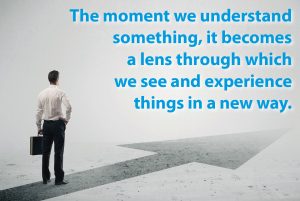
Solutions – Krishna C. Kalva
Learning is a one-way street: We can’t undo understanding
I recently read an article on the topic of impermanence, which explains how everything is always changing in our lives. The key message was to understand the concept of “no going back.” I want to share my takeaways from the concept with you.
It is generally observed that a person cannot undo an understanding after having discovered it. The moment we understand something, it becomes a lens through which we see and experience things in a new way. There is no going back to not understanding.
Every time we revisit a situation that used to be unclear, our focus automatically shifts to what we were able to perceive and understand. We can only visualize how we transitioned from a non-discovery to a discovery stage; we cannot remain in both stages at the same time as our perspective about the given situation already changed through our understanding.
A New Lens
To put the concept of impermanence into perspective, consider watching a movie with a surprising ending. After you have been surprised, you can watch the movie again, but you cannot be surprised anymore.
The story and the surprise and perhaps even the whole idea of the movie is impermanent from the perspective of a viewer. Once the surprise element is uncovered, there is no going back to anticipating the surprise as we already discovered it and start reflecting about the movie and our experience with a new lens of understanding.
In business life we all encounter situations wherein we collectively work together on various topics, some strategically more important and complex than others. It is often observed that ideas collected as a group require brainstorming and rethinking before we all agree on the expected outcomes.
At every given stage, the discussions drive the approach taken by the team, thereby leading toward different outcomes. It is an iterative and agile process, and we observe that the questions raised throughout the brainstorming process are increasingly powerful as they steer our thoughts and help us move forward.
Shifting References
Once we collectively gain an understanding about a given problem at hand, it is not possible to not understand when we revisit or encounter a similar problem again. Every time we look at the problem, our basis of reference shifts to the newly discovered understanding as we start seeing things with a new lens.
We have come to the profound realization that the journey undertaken to reflect our thoughts and ideas over the questions is much more rewarding than finding the answers. Our collective thought patterns reflect our line of thinking as the questions help us facilitate and create a path to move forward. We observe that there is no going back to our initial state of limited understanding and lesser degree of being informed, and we become less attached to any preconceived outcomes.
Conclusion
Let me take your attention back to the original idea, impermanence. The situations we encounter and the people we interact with are subject to situations or circumstances. As situations change, there is a necessary shift in the way we think and behave, and we can choose to accept the change. When change is resisted, it often leads to experiencing discomfort.
The concept of no going back offers perspective as a tool to observe how life in general unfolds and how each one of us needs to acknowledge the unfolding and to adapt.
The analogy of unfolding can be associated with a game of Tetris. We never know what shape appears until we see it. We cannot change the piece that is about to show up, instead we need to adapt our moves to move forward with the game.
Once we start seeing change with a new lens of perspective, we start to form anew relationship with change, inviting ourselves to have a new level of understanding.
 Krishna C. Kalva is learning solution manager at Siemens Healthineers. Email him at krishnachaitanya.kalva@siemens-healthineers.com.
Krishna C. Kalva is learning solution manager at Siemens Healthineers. Email him at krishnachaitanya.kalva@siemens-healthineers.com.









